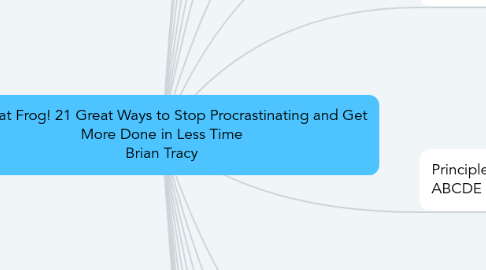Eat That Frog! 21 Great Ways to Stop Procrastinating and Get More Done in Less Time Brian Tracy
von Tiffany Rice

1. Principle 3: Apply the 80/20 Rule
1.1. 20% of your activities will account for 80% of your results
1.2. Time, Energy, Resources
2. Principle 1: Set the Table
2.1. Be clear on the quantifiable outcome that you want (Actions create clarity)
2.2. Remove vagueness from all areas of your life
2.3. Stop listening to others who directly/directly tell you how to live your life. Only you know what is best for yourself and your contribution
3. Principle 2: Plan Each Day in Advance
3.1. Use tasks list or a software like Trello or Asana to sequence and manage your day
3.2. Organize based on highest and best use and fastest route to your desired outcome
3.3. Plan the next day at the end of the current day
4. Principle 21: Single Hand Every Task
4.1. Practice focus of will and doing only one thing at a time till completion
4.2. Block your times
4.3. Practice the Pomodoro technique
5. Principle 20: Develop a Sense of Urgency
5.1. Flow state
5.2. Adjust your ideologies surrounding urgency
6. Principle 19: Create Large Chunks of Time
6.1. Block the time in your schedule
6.2. If you don't take control of your time, others will do it for you
7. Principle 4: Consider the Consequences
7.1. Develop long-range thinking
7.2. Increase your level of awareness
7.3. Know that everything has cause and effect
8. Principle 18: Slice and Dice the Task
8.1. Take a project and break it down to multiple tasks, focusing on one task at a time
9. Principle 17: Do the Most Difficult Task First
9.1. You have more energy and willpower in the start
10. Principle 5: Practice the ABCDE Method Continually
10.1. "A" = very important, highest outcome, short and long term
10.2. "B" = you should do that has mild consequences
10.3. "C" is nice to do but there are no consequences
10.4. "D" = something that you can delegate to someone, which frees up time for you to work your A.
10.5. "E" is something you can eliminate because it makes not difference at all.
11. Principle 16: Practice Creative Procrastination
11.1. Everyone procrastinates but if you're going to do it, do it on something that is still going to move your forward.
12. Principle 15: Motivate Yourself Into Action
12.1. Learn what motivates you and use these aspects as tools
13. Principle 6: Focus on Key Result Areas
13.1. What do you bring to the table?
13.2. What can you pass on to others to do?
14. Principle 14: Maximize Your Personal Powers
14.1. Physical, mental, and emotional energies make up your personal performance and productivity so guard and nurture your energy level.
15. Principle 13: Put Pressure on Yourself
15.1. Be a leader, someone who can work without supervision
15.2. While it is good to have accountability you also need to develop self-accountability
16. Principle 7: Obey the Law of Forced Efficiency
16.1. You can only do one thing at a time and you only get 24 hours in each day
16.2. What is the most valuable use of your time, right now
17. Principle 12: Take it One Oil Barrel at a Time
17.1. Take the first step
17.2. Break down into smaller steps
17.3. Actions create clarity
18. Principle 8: Prepare Thoroughly Before You Begin
18.1. Create a workspace that you'll enjoy working in and which bring out the highest level of productivity in you
19. Principle 9: Do Your Homework
19.1. Learn what you need to do take action
19.2. Practice Kaizen in all areas of your craft
20. Principle 10: Leverage Your Special Talents
20.1. Identify your unique skills and commit yourself to becoming good in these areas
21. Principle 11: Identify Your Key Constraints
21.1. What is holding you back in things, people situations?


